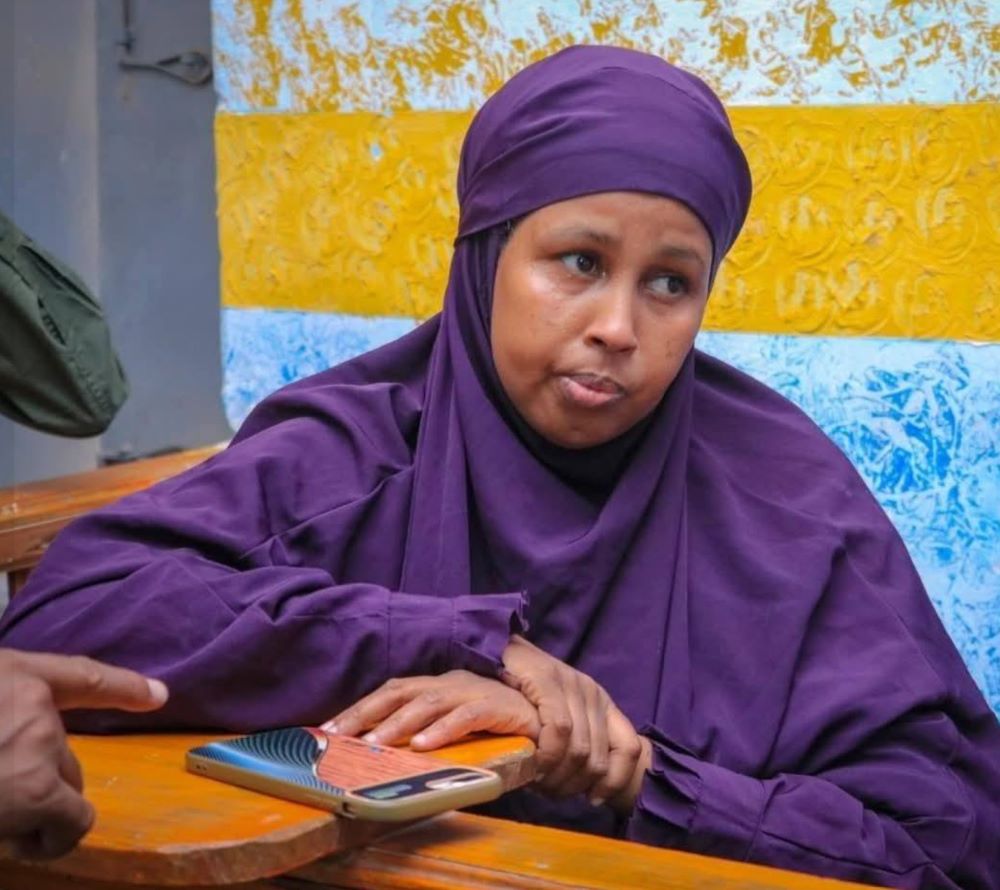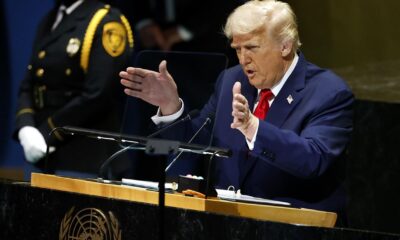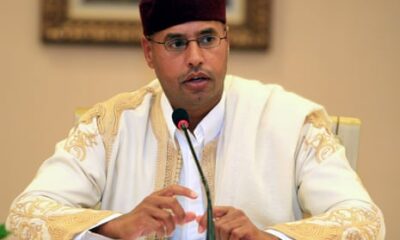News
Burkina Faso, Mali, Niger Quit ICC, Slam Court as Neo-Colonial Tool

Burkina Faso, Mali, Niger Quit ICC, Slam Court as Neo-Colonial Tool
Burkina Faso, Mali, and Niger have jointly announced their withdrawal from the International Criminal Court (ICC), accusing the tribunal of being an “instrument of neo-colonialist repression.”
In a statement on Tuesday, the three military-led governments said they would no longer recognise the authority of the UN-backed court in The Hague, citing its alleged failure to prosecute “proven war crimes, crimes against humanity, genocide and aggression.”
“The ICC has proven itself incapable of handling such cases,” the leaders declared, insisting they would instead establish “indigenous mechanisms for the consolidation of peace and justice.”
The move adds to rising tensions between the Sahel states and Western powers.
All three countries, which are ruled by juntas after successive coups between 2020 and 2023, form the Confederation of Sahel States and have increasingly tilted toward Russia for political and military support.
The ICC, created in 2002 to prosecute the world’s most serious crimes, has faced frequent accusations of anti-African bias.
Out of 33 cases opened since inception, all but one have involved African nations.
Rwanda’s President Paul Kagame has previously criticised the court for what he described as its “selective justice.”
Under ICC rules, withdrawals take effect one year after formal notification to the United Nations. Until then, the court technically retains jurisdiction.
The latest announcement follows another coordinated decision by Burkina Faso, Mali, and Niger earlier this year to pull out of the Economic Community of West African States (ECOWAS), rejecting demands to restore democratic governance.
Observers note that the withdrawal also shields the three juntas from potential ICC scrutiny, as their forces have been accused of atrocities against civilians in the fight against jihadist insurgents linked to al-Qaeda and the Islamic State.
Meanwhile, Russia, whose President Vladimir Putin was indicted by the ICC in 2023 for alleged war crimes in Ukraine, has consolidated ties with the Sahel trio, deepening their isolation from France and other Western partners.
At press time, the ICC has yet to issue an official response to the Sahel states’ withdrawal.
News
Puntland Executes Woman for Murder of 14-Year-Old Girl

Puntland Executes Woman for Murder of 14-Year-Old Girl
Authorities in Puntland, a semi-autonomous region of Somalia, have executed a woman convicted of murdering a 14-year-old girl, in a rare case in which the death penalty was carried out against a female offender.
The convict, Hodan Mohamud Diiriye, 34, was executed by firing squad on Tuesday in Galkayo, the capital of Mudug region, after a court found her guilty of beating a teenage girl to death.
The victim, identified as Saabirin Saylaan, had been working as a domestic helper in Diiriye’s household.
Her killing in November triggered widespread protests in Galkayo and renewed calls for stronger child protection measures in the region.
Officials said the execution was carried out under qisas, an Islamic legal principle that allows the family of a murder victim to demand capital punishment instead of accepting financial compensation.
Mudug State Governor, Faysal Sheikh Ali, confirmed that members of both the victim’s family and the convict’s family were present during the execution.
A regional decree mandates the enforcement of Islamic law in murder cases, according to Puntland authorities.
Officials also said the execution marked the first time in more than a decade that a woman had been put to death under a retaliatory sentence in Puntland.
The last known execution involving a woman occurred in 2013, when 13 members of the Islamist militant group, al-Shabab, including one woman, were executed for their role in the killing of a prominent Islamic cleric, authorities said.
Investigations revealed that Saabirin, who was orphaned at a very young age after losing both parents, had been living with Diiriye’s family for about two months before her death.
Police said the teenager had suffered repeated physical abuse during that period.
Digital evidence recovered during the investigation reportedly showed a pattern of sustained violence, some of which circulated publicly ahead of the trial.
A post-mortem examination found that the victim sustained multiple injuries consistent with prolonged abuse, authorities said.
As details of the case emerged, public outrage intensified, with hundreds of women and youths staging protests across Galkayo, demanding justice for the victim and accountability for those involved.
Community leaders, activists and civil society groups have since renewed calls for stronger legal protections for children and domestic workers, who they say remain particularly vulnerable to abuse in Somalia.
The case has drawn national attention to the often-hidden problem of child abuse, especially within domestic and extended family settings, where such cases frequently go unreported.
News
Muammar Gaddafi’s Son, Saif al-Islam, Reportedly Shot Dead in Libya

Muammar Gaddafi’s Son, Saif al-Islam, Reportedly Shot Dead in Libya
Saif al-Islam Gaddafi, son of Libya’s former leader, Col. Muammar Gaddafi, has reportedly been shot dead in circumstances that remain unclear, Libyan media sources said on Tuesday.
The death of the 53-year-old politician was confirmed by the head of his political team, according to the Libyan News Agency.
However, conflicting accounts have emerged over the circumstances surrounding his death.
His lawyer told the AFP news agency that Saif al-Islam was assassinated at his residence in the city of Zintan by a “four-man commando” unit.
The lawyer did not disclose who may have been responsible for the killing.
In a separate version of events, Saif al-Islam’s sister told Libyan television that he died near Libya’s border with Algeria.
Saif al-Islam Gaddafi was long regarded as the most powerful and feared figure in Libya after his father, who ruled the country from 1969 until he was ousted and killed during a popular uprising in 2011.
Born in 1972, Saif al-Islam played a prominent role in Libya’s rapprochement with Western nations from around 2000 until the collapse of the Gaddafi regime.
Despite holding no official government position, he wielded significant influence and led high-level negotiations on behalf of his father.
These efforts included talks that culminated in Libya abandoning its nuclear weapons programme, a move that led to the lifting of international sanctions and restored diplomatic ties with Western countries.
At the time, Saif al-Islam was widely portrayed as a reformist figure and the acceptable face of a changing Libya.
Following the fall of his father’s government, Saif al-Islam was accused of playing a key role in the violent repression of anti-government protests in 2011.
He was subsequently captured and detained by a militia in Zintan, where he spent nearly six years in custody.
The International Criminal Court sought his extradition to face charges of crimes against humanity related to the suppression of the uprising.
In 2015, a court in Tripoli sentenced him to death in absentia for his alleged role in the crackdown, although the ruling was rejected in eastern Libya.
He was released in 2017 by a militia in Tobruk under an amnesty law enacted by authorities in the east of the country.
Since the overthrow of Muammar Gaddafi, Libya has remained deeply divided, with rival governments and numerous armed groups controlling different parts of the country.
Although Saif al-Islam had repeatedly denied any ambition to succeed his father, insisting that power was “not a farm to inherit,” he re-emerged on the political scene in 2021 when he announced his intention to contest the presidency.
That election was later postponed indefinitely, prolonging Libya’s political uncertainty.
As of Tuesday, Libyan authorities had yet to issue an official statement clarifying the circumstances surrounding his reported death.
News
DA Leader Steenhuisen to Step Down, Raising Fresh Uncertainty Over S’africa Coalition

DA Leader Steenhuisen to Step Down, Raising Fresh Uncertainty Over S’africa Coalition
Leader of South Africa’s Democratic Alliance (DA), John Steenhuisen, has announced that he will not seek re-election when the party holds its leadership contest in April, a decision that could unsettle the country’s fragile coalition government.
The DA, South Africa’s second-largest political party, entered into an unprecedented coalition with its long-time rival, the African National Congress (ANC), in 2024 after the ruling party lost its parliamentary majority for the first time since 1994.
Steenhuisen, who assumed leadership of the pro-business DA in 2019, currently serves as Minister of Agriculture in President Cyril Ramaphosa’s coalition government.
The 49-year-old politician had been widely expected to contest the leadership position again, but reports suggest he was compelled to abandon his bid amid a series of internal controversies within the party.
Confirming his decision at a press conference, Steenhuisen said he would devote his full attention to his ministerial responsibilities for the remainder of the administration’s tenure.
“For the rest of this term of office, I will focus all of my time and energy as Minister of Agriculture on defeating the most devastating foot and mouth disease outbreak our country has ever seen,” he said.
His decision has raised concerns about the future direction of the DA and the potential implications for the stability of the ANC-DA coalition, which has faced criticism and resistance from factions within both parties.
The DA has yet to announce a successor or provide further details on the leadership transition process.
-

 Milestone4 days ago
Milestone4 days agoChief Chukwuma Johnbosco and the Making of a Purpose-Driven Leader
-

 News4 days ago
News4 days agoUS Sends Troops to Nigeria Over Rising Terror Threats
-

 Sports5 days ago
Sports5 days agoEx-Sri Lanka Star Jayasuriya Named in USA Squad for T20 World Cup
-

 Sports5 days ago
Sports5 days agoLens Edge Le Havre to Reclaim Ligue 1 Top Spot
-

 Sports5 days ago
Sports5 days agoJustin Rose Sets 36-Hole Record, Opens Four-Shot Lead at Torrey Pines
-

 News4 days ago
News4 days agoMuammar Gaddafi’s Son, Saif al-Islam, Reportedly Shot Dead in Libya

















